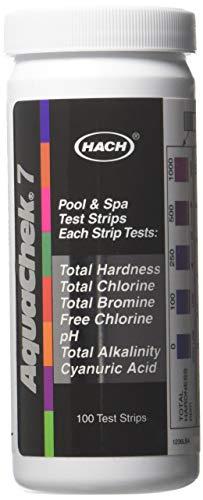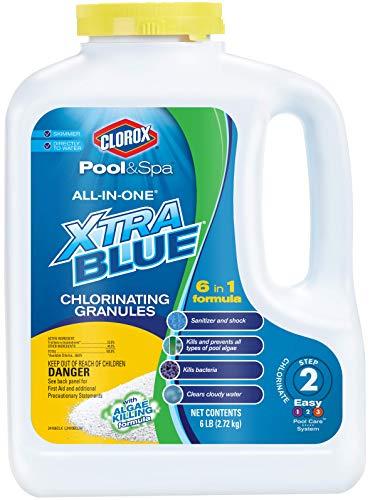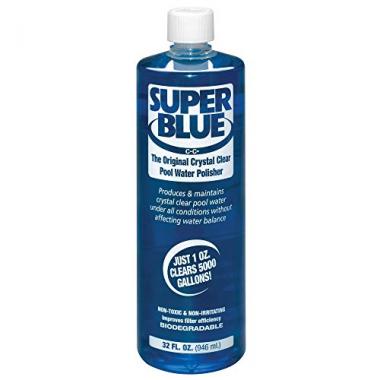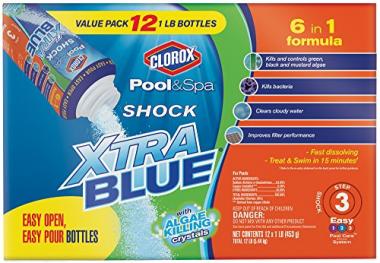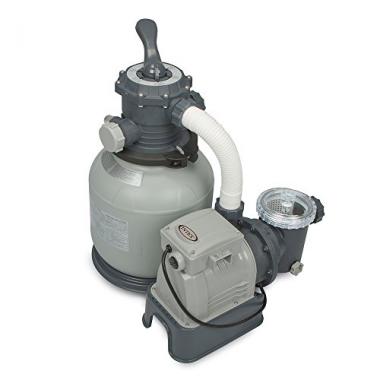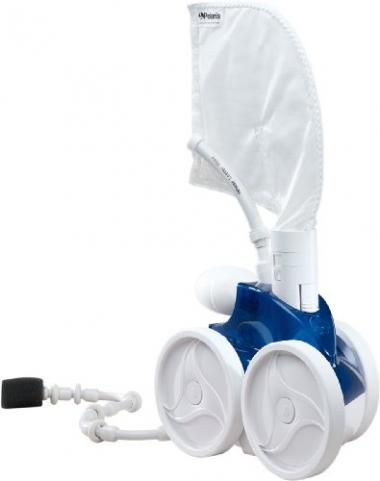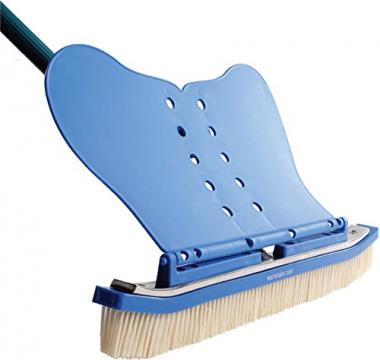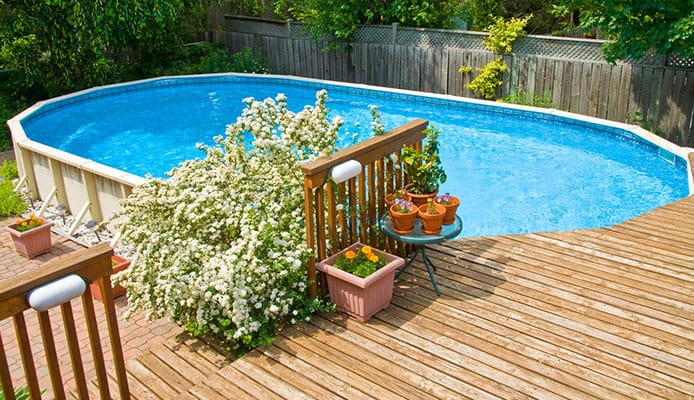
Above ground, pools are one of the fun and family-friendly ways to incorporate water activities at your own home! Above ground, pool maintenance is important to know so that you can protect your above ground pool, which is costly and needs protection. While the job isn’t an easy one, it’s not too difficult, so don’t let this dissuade you from keeping your pool open!
How to Maintain and Clean Your Pool
1. Balancing Pool Water
Keeping your pool water balanced is one of the most important parts of owning a pool. A balanced pool is healthy and doesn’t let bacteria grow within it, and it’s easy to check. A water testing kit will show you what your current levels are so that you can fix the correct things. The following are the appropriate levels for the different parts of your pool:
– Alkalinity: 80-120 ppm
– pH: 7.2-7.6
– Chlorine: 2.0-4.0
– Calcium: 250-400 ppm
Keeping your pool water balanced is one of the most important parts of owning a pool. A balanced pool is healthy and doesn’t let bacteria grow within it, and it’s easy to check. A water testing kit will show you what your current levels are so that you can fix the correct things. The following are the appropriate levels for the different parts of your pool:
- Alkalinity: 80-120 ppm
- pH:2-7.6
- Chlorine: 0-4.0
- Calcium: 250-400 ppm
These levels should be tested once a week to make sure that your above ground pool is clean and healthy to swim in.
2. Sanitizing Your Above Ground Pool
Sanitizing your above ground pool is extremely important. All kinds of bacteria and oils get into the pool water that you can’ even see, so don’t just assume that your pool is safe just because the water is clear!
Sanitizing solution gets rid of algae and bacteria and even protects your above ground pool from growing them as well. Normally people use chlorine tablets to sanitize their pool, which can also come in stick or granule forms. The chlorine is where that classic pool smell comes from.
You can also use cartridge filtration systems to sanitize your pool. One of these that is commonly used is the Nature2 CF mineral sanitizer. Most people prefer these for their above ground pool maintenance needs because it reduces the amount of chlorine in their pool. They’re easy to install and maintain, and they’re fairly cheap, so they’re a perfect alternative for chlorine.
If you have to use chlorine, use stabilized chlorine. It is protected from the sun, making it work better and last longer. You can also consistently keep chlorine in your skimmer or automatic floater to help sanitize your above ground pool.
3. Keeping Your Water Clear
Using a pool clarifier helps you keep your pool clear, eliminating lotion, makeup, and sunscreen residue. This stuff can cause rashes, and it’s particularly bad for anyone with sensitive skin. Pool clarifiers also stop algae from growing even more.
There are two different types of pool clarifiers: synthetic and petroleum-based. Petroleum-based pool clarifiers help the earth and don’t normally contain any negative chemicals. They’re safe and help you maintain the above ground pool.
4. Shock Treatments
To combat the chlorine you put in your above ground pool, you have to shock your pool with shock treatments. Shock treatments break down the leftover chlorine in your pool water, which stops chemical and debris buildup. Shock treatments also kill algae and help clear away any smells from the different oils in the water, including, sadly, urine.
You can get a chlorine-based shock or non-chlorine shock. If you live somewhere that has hard water, there’s a special shock for that. Shocking your above ground pool can also help you clear your pool if the algae become overbearing. If this happens, here are some steps to help fix it:
- Shock your pool and let it sit for 24 hours
- Vacuum and brush every part of your pool
- Try to isolate the algae problem and get the correct algaecide to combat it
- Vacuum and brush your pool again, repeating daily if needed
- Balance your water levels
During this process, you’ll want to keep an eye on your filter and clean it regularly.
Typical Cleaning and Pool Maintenance
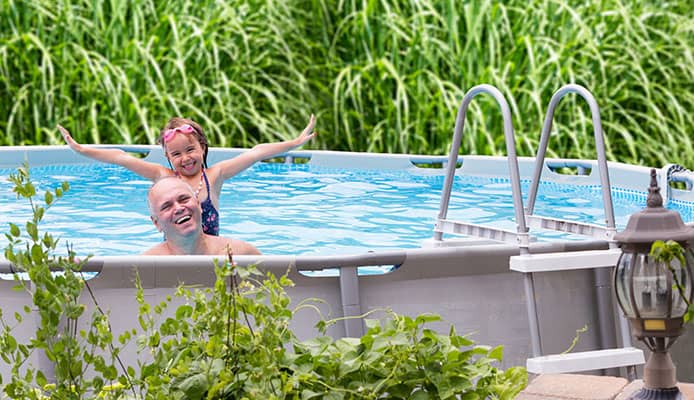
5. Filter and Pump
Your above ground pool filter is important for getting rid of dirt and grime in your pool, including the bacteria that you can’t see that comes from both inside and outside sources, like pool equipment and accessories. Your pump is responsible for keeping your pool water moving and getting through the filter. It’s a good idea to keep your filter and pump running for 8-12 hours to stop bacteria growth that is bred in standstill water.
You can either get a sand filtering system or a cartridge filtering system. Both of these systems have to be cleaned and maintained; sand filtering systems require backwashing once the pressure gauge raises too high and cartridge filtering systems are removed and washed by being sprayed with water. However, cartridge filters do have to be replaced every once in a while, so sand filtering systems are a bit cheaper.
6. Vacuum
It’s just as important to keep the liner of your above ground pool clean as it is to keep the water moving. Vacuums remove the dirt from your pool and stop algae from growing.
Standstill water in your pool causes bacteria to grow faster than normal, and many places in your pool are just naturally difficult to circulate. Vacuums can easily reach these areas, preventing further bacteria growth and keeping them clean.
You might also like: Best Blow Up Swimming Pools For Kids
7. Brush
While using an automatic cleaner works to clean your above ground pool, a brush is also recommended by most pool experts. Sometimes automatic cleaners may miss the same spots, so having a brush to scrub your above ground pools walls and the floor is a good idea. A brush should be used in addition to an automatic cleaner once a week, and you can even brush the surface of the pool to slow bacteria growth!
8. Prepare Your Above Ground Pool for the Winter
- Take your pool ladder and any other equipment out and leave it somewhere dry and sheltered, including your automatic cleaner, brush, vacuum, skimmer, toys, and floaters. This stuff can be damaged if you leave it in the pool over winter, so make sure to take it out to save yourself some money.
- Go to your local pool supply store and grab a winter chemical kit. If you have one of these, you won’t need to add any chemicals until it’s time to open the pool again!
- Before using the winter chemical kit, make sure that your water levels are balanced, then add the kit.
- Run the filter for one hour after you put in the winter chemical kit. This can vary by kit, so double-check the time on your specific one.
- Drain the water until it’s lower than the inlets and skimmers. Over winter, water can freeze. When water freezes, it expands, and if that water happens to be in your inlet or skimmer, it can easily break them. Lowering the water level prevents this from happening. You can also buy inserts and/or covers to further protect them.
- Disconnect the pump and the motor from the pool and store these with your other pool equipment from step one, making sure that the water is all out as well.
- Drain the hoses and filter tank, and throw out the old filter cartridge. Store these with the rest of your equipment.
- If you have a sand filter, dry everything working with it, and throw out the old sand filter. The other parts are also stored with the rest of your above ground pool equipment.
- If you have a Diatomaceous Earth Filter, make sure to get rid of the diatomite, and clean and dry the tank. Also, submerge all of the hoses in warm soapy water overnight. Clean them off the next day and store them with the rest of the equipment.
- Make sure to invest in some type of pool cover. You can get either a year-round or winter cover, but it’s important to at least have something covering your above ground pool. Make sure that it’s tight; winter storms can be harsh, and you don’t want your cover flying away!
Above Ground Pool Guides:
- Pool Deck Cleaning: How To Clean Pool Deck
- How To Heat An Above Ground Pool Fast
- Above Ground Pool Removal: How To Take Down Above Ground Pool
- 8 Solutions On How To Level An Above Ground Pool
- How To Setup Intex Pool In Less Than 1h
- Intex Pool Cleaning Guide: Intex Pool Chemicals Startup
- How To Drain An Above Ground Pool Very Fast
- DIY Above Ground Pool: Build Above Ground Pool From Scratch
- 5 Easy Steps To Open An Above Ground Pool
- What To Put under Above Ground Pool On Grass?
- Swimming in The Rain: Is It Safe to Swim in The Rain?
- What Is A Spool Pool?


